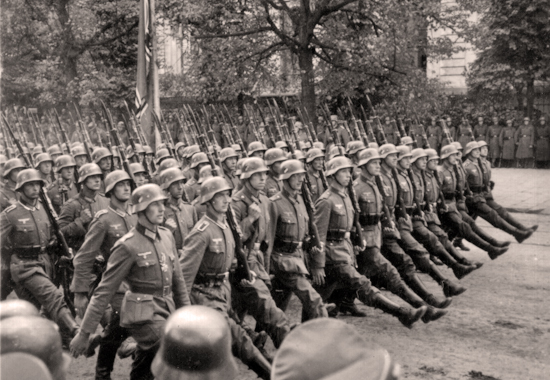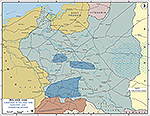|

GERMAN TROOPS IN WARSAW, POLAND - 1939
World War II Timeline - Year 1939
|
|
The
Second World War officially begun on
September 3, 1939.
This
timeline includes events that took
place before that day if they are
relevant to WWII. |
January 30, 1939
 Hitler gives his speech
Hitler gives his speech
 The Jewish Question.
The Jewish Question.
April 15, 1939
The President of the United
States,
 Franklin D. Roosevelt sends
Franklin D. Roosevelt sends
 Hitler
a telegram. These are its final paragraphs:
Hitler
a telegram. These are its final paragraphs:
We recognize complex world problems which
affect all humanity but we know that study
and discussion of them must be held in an
atmosphere of peace. Such an atmosphere of
peace cannot exist if negotiations are
overshadowed by the threat of force or by
the fear of war.
I think you will not misunderstand the
spirit of frankness in which I send you this
message. Heads of great Governments in this
hour are literally responsible for the fate
of humanity in the coming years. They cannot
fail to hear the prayers of their peoples to
be protected from the foreseeable chaos of
war. History will hold them accountable for
the lives and the happiness of all even unto
the last.
I hope that your answer will make it
possible for humanity to lose fear and
regain security for many years to come.
A similar message is being addressed to the
Chief of the Italian Government.
April 20, 1939
 Hitler's 50th birthday
Hitler's 50th birthday
April 28, 1939
At noon,
 Hitler delivers a hefty
Reichstag address, which takes two and a half hours. One and a half
hours into the speech, Hitler attends to Roosevelt's telegram from
April 15, 1939, which Hitler describes as a "curious document".
Hitler delivers a hefty
Reichstag address, which takes two and a half hours. One and a half
hours into the speech, Hitler attends to Roosevelt's telegram from
April 15, 1939, which Hitler describes as a "curious document".
August 18, 1939
 Hitler launches his
"Euthanasia" Program, i.e. the ordered killing of "unworthy eaters."
Hitler launches his
"Euthanasia" Program, i.e. the ordered killing of "unworthy eaters."
Initially, only children under the age
of three who are mentally or physically handicapped qualify. From
October 1939, the order will also include adults.
Under the code name
T4, this program will
eventually arrange the murder of approx. 275,000 people.
Why T4? Because the headquarters for
this project was located at Tiergarten Street 4, Berlin.
August 31, 1939
In the realms of the Third
Reich a hot and humid summer night — and the last quiet one — ends.
Europe doesn't know it yet, but it will take five years and eight
months until it will be this silent again. See
 May 8, 1945.
May 8, 1945.
Beginning of the
Second World War
September 1, 1939
Today, Friday, September 1,
1939, at 4:45 a.m., the German cruiser Schleswig-Holstein,
which anchored at the Danzig harbor, opened fire on the
heavily-fortified Polish Westerplatte.
Hitler's war on Poland has begun
without a declaration of war.
Major Sucharski, the commander of the
fleet at Gdynia, issues the following brief at 4:50 a.m.:
Westerplatte, September 1, 1939, 4:50 a.m.
At 4:45 a.m., the armored cruiser
Schleswig-Holstein opened fire from all
cannons on the Westerplatte. Shots continue
to be exchanged.
In response, Polish guards blow up the Dirschau bridge across the
Vistula which led from Danzig into the Corridor region.
Along the entire German-Polish border
and along the border of Czechoslovakia and Poland fire is exchanged.
The German Luftwaffe attacks targets
inside Poland.
Here is Danzig, Gdynia, the Polish
Corridor, and the Polish frontier on a map:

1939 Poland - Industry
Around 10:00 a.m. Hitler delivers his speech
 Returning Fire before the
Reichstag in Berlin. Here is the German transcript of the speech:
Returning Fire before the
Reichstag in Berlin. Here is the German transcript of the speech:
 Es wird jetzt zurückgeschossen
Es wird jetzt zurückgeschossen
Germany invades Poland. Hitler publishes his first war bulletin:
Das Oberkommando
der Wehrmacht gibt bekannt
(The High Command of the Wehrmacht announces):
On the orders of the Führer and Reich
Chancellor, the Wehrmacht has assumed the
active defense of the Reich.
Friday morning, in compliance with their
mission to halt the Polish aggression,
troops of the German Army passed all
German-Polish border checkpoints to launch a
counter-offensive.
At this time, Luftwaffe squadrons started to
put military objectives inside Poland out of
action. The Navy has assumed the defense of
the Baltic Sea.
September 3, 1939
Great Britain and France
declare war on Germany.
September 17, 1939
The Soviet Union invades
Poland.
More History
|